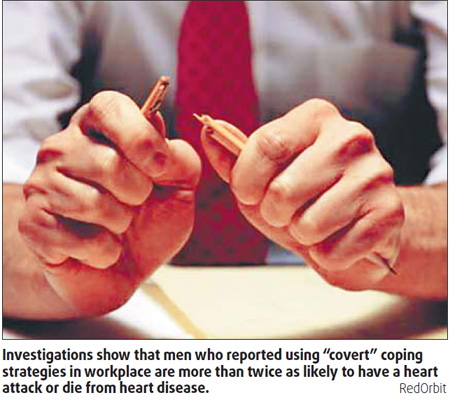Science and Health
'Covert' coping with job conflict ups heart risk
(China Daily/Reuters)
Updated: 2009-12-02 09:20

Walking away or letting things pass may be an unhealthy way to deal with unfair treatment on the job, research from Sweden shows.
Men who reported using such "covert" coping strategies were more than twice as likely to have a heart attack or die from heart disease over the next 10 years, Dr Constanze Leineweber of the Stress Research Institute at Stockholm University, and her colleagues, found.
Previous investigations have linked covert coping with job conflict to heart disease risk factors, but not heart disease itself, Leineweber and her team note in the Journal of Epidemiology and Community Health.
To investigate further, they looked at 2,755 men participating in a workplace study in Stockholm. Their average age was 41, and none had suffered a heart attack previously. The men enrolled in the study between 1992 and 1995. By 2003, a review of Swedish national records showed that 47 had either suffered a heart attack or died from heart disease.
Overall, the researchers found, men who reported using covert strategies to cope with conflict or unfair treatment were at about double the risk of heart attack or heart-related death.
And when Leineweber and her team looked only at the two strategies that reflected immediate response to such incidents - "going away" during the encounter or letting things pass without saying anything - they found that men who said they often used these coping strategies, were at six-fold greater risk of heart attack or heart-related death, even after the researchers adjusted for factors like age, high blood pressure, work-related demands, and level of autonomy on the job.
When the researchers accounted for level of conflict at the workplace, those who used these two covert coping methods were still at four-fold greater risk.
"The present data provide no answer to the question of what might be a particularly healthy coping strategy," Leineweber and her team note, pointing out that they found no relationship between "open" coping strategies such as protesting immediately, yelling at the person right away, or speaking to the person later after things had calmed down and heart attack or heart-related death.
Ultimately, they conclude, further research should examine whether interventions designed to reduce covert coping would alter the risk of heart attack and heart-related death.
Reuters






